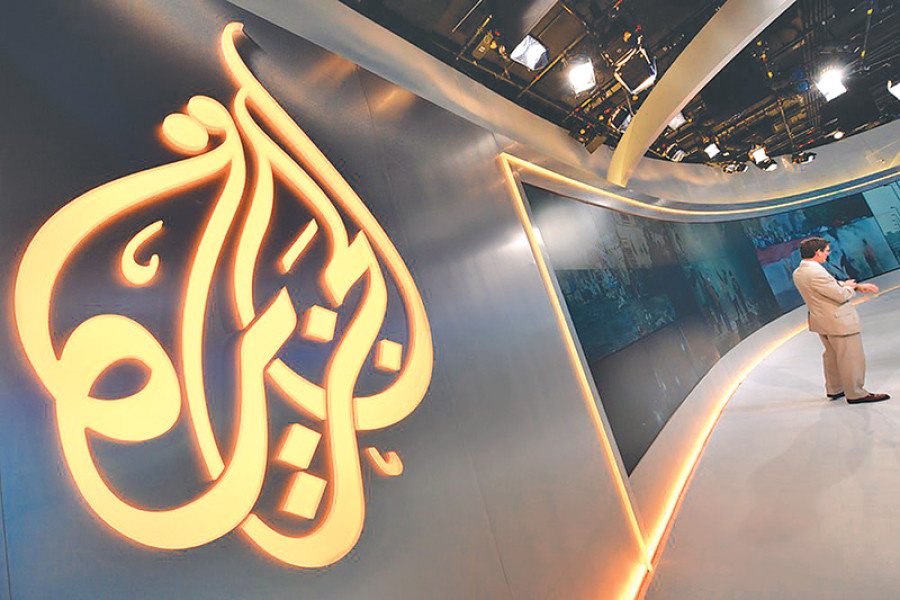Opinion
Al Jazeera in trouble
One of the demands made by the Saudi-led coalition after it imposed a sudden blockade against its tiny neighbour Qatar last June was that Al Jazeera television be shut down.
Indra Dhoj Kshetri
One of the demands made by the Saudi-led coalition after it imposed a sudden blockade against its tiny neighbour Qatar last June was that Al Jazeera television be shut down.
Saudi Arabia’s hostility towards the offstream global news network dates back to its founding. Al Jazeera Arabic was born out of the failure of a BBC-Saudi Arabia joint initiative in 1996.
It fell apart after Saudis were irked by its programmes on Saudi dissidents and human rights, leaving over 250 Arabic speaking journalists and managers jobless.
Qatari Emir Sheikh Hamad bin Khalifa Al Thani then stepped in and set up Al Jazeera Arabic. The channel went on-air in November 1996 and soon attracted millions of Arab viewers with its distinctive approach to regional and global issues.
Maintaining independence
Qatar remains a closed society, so how is it possible to have an independent media network like Al Jazeera? Many who have written about or worked with Al Jazeera would agree with its unique perspective on pertinent global issues.
However, it has also been concluded that there was a tacit understanding between Al Jazeera and the then Qatari Emir Sheikh Hamad. Al Jazeera wouldn’t challenge the Emir’s rule within the country and in return he would continue to fund the channel and give it a level of autonomy.
In the wake of 9/11, Al Jazeera Arabic became ‘notorious’ for broadcasting Taliban and Al Qaeda propaganda, and was blamed for being a mouthpiece of the terrorist groups.
As the channel saw prominence and global acclaim as well as rebuke, it launched an English language version in November 2006—now with clear ambitions to challenge, if not upset, the global news order. With the US fighting two deadly wars in Afghanistan and Iraq, the Taliban and Al Qaeda ‘propaganda’ being broadcast by an English language channel had the potential to reverse the course of the conflict.
By challenging the official rhetoric of pro-war Western governments, Al Jazeera could also change popular support in their countries.
Consequently, Al Jazeera was blacked out by almost all cable providers in the US and Canada, and many other countries followed suit.
But it found a way to circumvent the ban by enriching its online version and starting a YouTube channel. Al Jazeera also became available free-to-air through satellite and cable providers, forcing commercial US and European TV channels to start providing their contents free to global audiences.
It also moved the competition from conventional television journalism to online. Al Jazeera not only infuriated the political leadership but also challenged the hegemony of Western media.
Al Jazeera’s strategic location gives it enviable access to sources and events in the constant hotbed of international politics and diplomacy—the Israel-Palestine conflict and the Middle East crisis. When global channels including the BBC and CNN refrained from criticising the Israeli regime for its inhuman acts against Palestinians, Al Jazeera filled in the vacuum with harsh criticism and showed a perspective never seen on the so-called global news channels.
Israel reacted by announcing that the network office would be closed and the media credentials of Al Jazeera journalists would be revoked. The strategic advantage helped it to report from conflict zones in Iraq and Afghanistan and the centre of protest during Arab Spring, thus elevating its standing as a truly global news network.
Different perspective
Al Jazeera has also maintained this counter perspective when reporting on small countries like Nepal. I compared the coverage of Nepal’s peace process by CNN and Al Jazeera for my Master’s thesis in 2010, and discovered that CNN had not given even 15 percent of the coverage given by Al Jazeera.
The channel continues this policy till today. You will find that it not only covers every major political development in Nepal but also gives a perspective on subtle issues like inclusion, women’s struggles, earthquake and floods.
However, one occasion when it failed to give balanced coverage was during the blockade by India in 2015. When most Western media outlets were calling a spade a spade, that is stressing India’s role in imposing the blockade, Al Jazeera shied away from blaming India.
Al Jazeera was launched with $137 million provided by the then Emir Sheikh Hamad. It was expected that the channel would be earning enough to cover its recurring costs by the turn of the century.
This didn’t happen, and the Emir gave another $137 million in 2001. Details of the financing since then are not publicly available, but it is assumed that the Qatar Emir continues to fund the network’s English and Arabic versions.
Meanwhile, its patron Sheikh Hamad has abdicated in favour of his son Sheikh Tamam. It has been reported that the son is less generous than his father. Dwindling oil prices has already strained the country’s oil-dependent economy.
Calls from regional powers to shut down Al Jazeera and the tacit support of the global powers have raised questions over the future of the channel.
However, the acclaim it has received and the role it has played in taking a small Arab nation to prominence will make it difficult for Qatar to make such a decision—the international clout it gives is too dear to give up.
As long as it survives, current executives have made it clear that it won’t change its editorial course.
Kshetri is a development communicator and media researcher




 10.12°C Kathmandu
10.12°C Kathmandu










